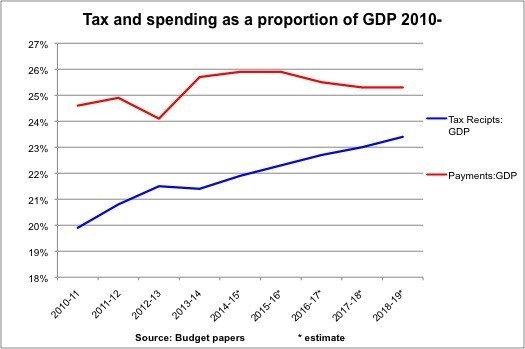“We will deliver a surplus in our first year and every year after that.”
Joe Hockey, January 2013
“We never put a date on returning to surplus.”
Joe Hockey, April 2015
“The government has a credible path to surplus, despite a $52 billion write-down in tax receipts …”
2015 Budget
The government has unveiled yet another deficit blowout as a sluggish economy and a fall in commodity prices force still more revenue write-downs.
In tonight’s budget, the 2015-16 deficit is forecast to be $35.1 billion, up from $31.2 billion in December’s MYEFO and $17.1 billion forecast in last year’s budget.
The forecast deficit for the following year, 2016-17, has also ballooned a further $5 billion from MYEFO to $25.8 billion. With a small rise in the predicted deficit for 2014-15, it means the combined deficit for the period 2014-18 has more than doubled since the government’s first major economic statement in December 2013, to a total of over $116 billion.
The outcome means that the government’s net debt will reach $325.4 billion, or 16.8% of GDP in 2018-19, compared to 12.8% in 2013-14.
The blowout is driven by further write-downs: tax receipts are forecast to come in $9 billion lower this year than forecast last May, while 2015-16 receipts, expected to be more than $385 billion in last year’s budget, are now expected to be $370 billion. The final result could be worse still.
In 2014-15, company tax revenue has gone down by nearly a billion dollars compared to MYEFO, while in 2015-16 personal income tax is down $2 billion on MYEFO forecasts and corporate tax is down another $2 billion.
That means the government’s “credible path to surplus” is still predicated on taking more out of the economy in tax than Labor did, putting the lie to the government’s current insistence that it is the party of lower taxes.
Moreover, strikingly, the Coalition’s spending will remain above Labor levels. Spending in both 2014-15 and 2015-16 will be 25.9% of GDP, compared to 25.7% in Labor’s final year. And instead of falling below 25% over the forward estimates, the budget papers show spending will remain at 25.3% — higher than all but two of the Rudd/Gillard years.
In short, this budget makes the Coalition the big-taxing, big-spending party of Australian government. And it now looks like it’s the big deficits party too.










I assume, Bernard, that you’re aware of problems an incoming Government [even one YOU like] can be saddled with unfunded commitments made by its predecessor?
Perhaps not.